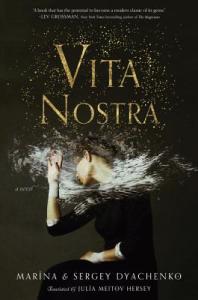Title: Vita Nostra
Authors: Marina and Sergey Dyachenko
Genre: Magical Realism
Trigger Warnings: Body horror (major), vomit (major), threats of death, stalking, manipulation, blood (mentions), alcohol use, sexual content (mostly off-page), forced sex work (mentions), death, suicide attempt, suicidal ideation, abelism (mentions)
Back Cover:
While vacationing at the beach with her mother, Sasha Samokhina meets the mysterious Farit Kozhennikov under the most peculiar circumstances. The teenage girl is powerless to refuse when this strange and unusal man with an air of the sinister directs her to perform a task with potentially scandalous consequences. He rewards her effort with a strange golden coin.
As the days progress, Sasha carries out other acts for which she receives more coins for Kozhennikov. As summer ends, her domineering mentor directs her to move to a remote village and use her gold to enter the Institute of Special Technologies. Though she does not want to go to this unknown town or school, she also feels it’s the only place she should be. Against her mother’s wishes, Sasha leaves behind all that is familiar and begins her education.
As she quickly discovers, the institue’s “special technologies” are unlike anything she has ever encountered. The books are impossible to read, the lessons obscure to the point of maddening, and the work refuses memorization. Using terror and coercion to keep the students in line, the school does not punish them for their transgressions and failures; instead, their families pay a terrible price. Yet despite her fear, Sasha undergoes changes that defy the dictates of matter and time; experiences which are nothing she has ever dreamed of … and suddenly all she could ever want.
A complex blend of adventure, magic, science, and philosophy that probes the mysteries of existence, filtered through a distinct Russian sensibility, this astonishing work of speculative fiction – brilliantly translated by Julia Meitov Hersey – is reminiscent of modern classics such as Lev Grossman’s The Magicians, Max Barry’s Lexicon, and Katherine Arden’s The Bear and the Nightingale, but will transport you to a place far beyond those fantastical worlds.
Review:
I legitimately expected to DNF this pretty early in. The back cover didn’t sound super great (the “school where the lessons can’t be memorized” was the only intriguing bit), and I was very concerned about the adult man making a 16-year-old girl do “potentially scandalous” things. (If you’re concerned, it’s uncomfortable for Sasha but not inappropriate). The only reason I picked it up at all was because I’m trying to read new ideas from voices I don’t often hear and this book was a bestseller in Russia. I was kinda curious what a Russian bestseller would be about, but I didn’t have high hopes.
This is going to be more of a list of the things I don’t understand. Starting with the genre – I think magical realism is the closest, but strong arguments could be made for low fantasy, psychological horror, or even contemporary. The back cover is pretty lame, but like the mentioned lessons defy memorization, this book defies categorization. I described it to my husband as “a magical school narrative, but if Hogwarts was a brainwashing cult,” and that’s close but still fails to capture the full essence of this novel.
It’s impossible to adequately describe this book, the experience of reading this book, in words. It’s a first-person narrative of a girl falling into madness such that you don’t notice how mad she is until other characters point it out. It’s a first-person narrative of a girl whose eyes are opened to the true power within her and transcends her mortal form. It’s bizarre, surreal, uncomfortable and unsettling, and somehow made my reality outside of the book seem just a little bit off-kilter every time I put it down. It’s the kind of book that makes you want to stare at all wall for a while until you process what you just read. For a while I didn’t understand, and then I sort of understood, and by the time I finished I still didn’t really understand but I loved it.
I still don’t know whose “side” the Institute is on, if they’re good or bad, or if those terms even apply. I still am not entirely sure if the deadly consequences that seem to happen whenever Sasha and her schoolmates fail are truly orchestrated by these people or if they’re all just terrible coincidences, though by the end I, like Sasha, tended towards belief. I still don’t know if I entirely “liked” this novel, but I do know that I was completely and utterly enthralled. Baffled, disturbed, and unnerved, yes, but also engrossed, captivated, and desperately curious to continue, to be in this book and this story and this … whatever exactly it is. The Dyachenkos have created an experience in reading that is akin to Sasha’s experience at the institute. It defies understanding, it defies explanation, it defies review, but all I wanted while reading was to continue to be immersed in this surreal and fantastic story.
The Vita Nostra series:
- Vita Nostra
- Assassin of Reality

